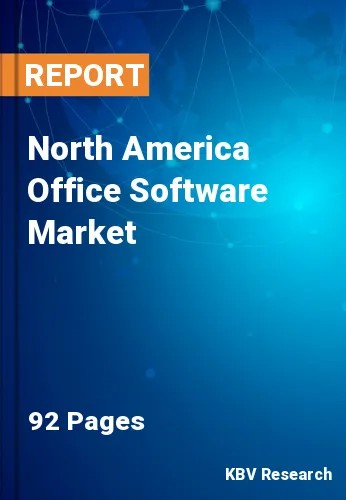Chapter 1. Market Scope & Methodology
1.1 Market Definition
1.2 Objectives
1.3 Market Scope
1.4 Segmentation
1.4.1 North America Office Software Market, by Type
1.4.2 North America Office Software Market, by Deployment
1.4.3 North America Office Software Market, by Country
1.5 Methodology for the research
Chapter 2. Market Overview
2.1 Introduction
2.1.1 Overview
2.1.1.1 Market Composition and Scenario
2.2 Key Factors Impacting the Market
2.2.1 Market Drivers
2.2.2 Market Restraints
Chapter 3. Competition Analysis - Global
3.1 KBV Cardinal Matrix
3.2 Recent Industry Wide Strategic Developments
3.2.1 Partnerships, Collaborations and Agreements
3.2.2 Acquisition and Mergers
3.3 Market Share Analysis, 2021
3.4 Top Winning Strategies
3.4.1 Key Leading Strategies: Percentage Distribution (2018-2022)
3.4.2 Key Strategic Move: (Acquisition and Mergers: 2018, May – 2022, Aug) Leading Players
Chapter 4. North America Office Software Market by Type
4.1 North America Spreadsheet Software Market by Country
4.2 North America Word Processing Software Market by Country
4.3 North America Presentation Software Market by Country
4.4 North America Visualization Software Market by Country
4.5 North America Others Market by Country
Chapter 5. North America Office Software Market by Deployment
5.1 North America Cloud Market by Country
5.2 North America On-Premises Market by Country
Chapter 6. North America Office Software Market by Country
6.1 US Office Software Market
6.1.1 US Office Software Market by Type
6.1.2 US Office Software Market by Deployment
6.2 Canada Office Software Market
6.2.1 Canada Office Software Market by Type
6.2.2 Canada Office Software Market by Deployment
6.3 Mexico Office Software Market
6.3.1 Mexico Office Software Market by Type
6.3.2 Mexico Office Software Market by Deployment
6.4 Rest of North America Office Software Market
6.4.1 Rest of North America Office Software Market by Type
6.4.2 Rest of North America Office Software Market by Deployment
Chapter 7. Company Profiles
7.1 Microsoft Corporation
7.1.1 Company Overview
7.1.2 Financial Analysis
7.1.3 Segmental and Regional Analysis
7.1.4 Research & Development Expenses
7.1.5 Recent strategies and developments:
7.1.5.1 Partnerships, Collaborations, and Agreements:
7.1.5.2 Acquisition and Mergers:
7.1.6 SWOT Analysis
7.2 Google LLC
7.2.1 Company Overview
7.2.2 Financial Analysis
7.2.3 Segmental and Regional Analysis
7.2.4 Research & Development Expense
7.2.5 Recent strategies and developments:
7.2.5.1 Acquisition and Mergers:
7.2.6 SWOT Analysis
7.3 IBM Corporation
7.3.1 Company Overview
7.3.2 Financial Analysis
7.3.3 Regional & Segmental Analysis
7.3.4 Research & Development Expenses
7.3.5 Recent strategies and developments:
7.3.5.1 Acquisition and Mergers:
7.3.6 SWOT Analysis
7.4 Oracle Corporation
7.4.1 Company Overview
7.4.2 Financial Analysis
7.4.3 Segmental and Regional Analysis
7.4.4 Research & Development Expense
7.4.5 Recent strategies and developments:
7.4.5.1 Partnerships, Collaborations, and Agreements:
7.4.5.2 Acquisition and Mergers:
7.4.6 SWOT Analysis
7.5 Salesforce.com, Inc.
7.5.1 Company Overview
7.5.2 Financial Analysis
7.5.3 Regional Analysis
7.5.4 Research & Development Expense
7.5.5 Recent strategies and developments:
7.5.5.1 Partnerships, Collaborations, and Agreements:
7.5.5.2 Acquisition and Mergers:
7.5.6 SWOT Analysis
7.6 Broadcom, Inc. (Symantec Corporation)
7.6.1 Company Overview
7.6.2 Financial Analysis
7.6.3 Segmental and Regional Analysis
7.6.4 Research & Development Expense
7.6.5 SWOT Analysis
7.7 Dell Technologies, Inc.
7.7.1 Company Overview
7.7.2 Financial Analysis
7.7.3 Segmental and Regional Analysis
7.7.4 Research & Development Expense
7.7.5 SWOT Analysis:
7.8 HP, Inc.
7.8.1 Company Overview
7.8.2 Financial Analysis
7.8.3 Segmental and Regional Analysis
7.8.4 Research & Development Expenses
7.8.5 Recent strategies and developments:
7.8.5.1 Acquisition and Mergers:
7.9 Citrix Systems, Inc.
7.9.1 Company Overview
7.9.2 Financial Analysis
7.9.3 Regional Analysis
7.9.4 Research & Development Expense
7.9.5 SWOT Analysis

